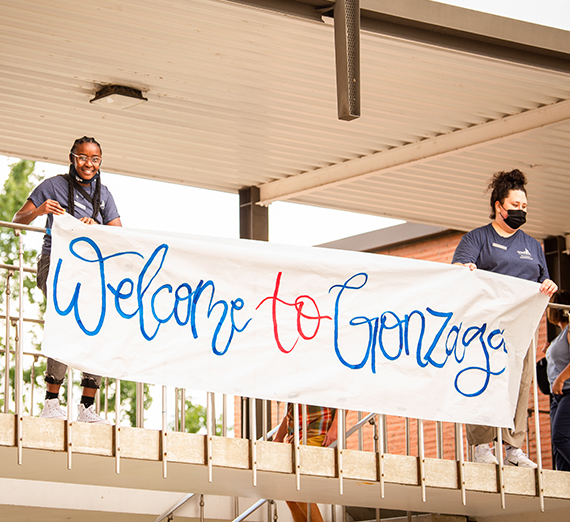Welcoming Students to Campus

This past week, students moved into their residence halls and began the fall semester here at GU. In the 2020-2021 school year, 91勛圖厙 entered a hybrid format to accommodate both virtual and in-person students in light of the COVID-19 crisis. This school year, we are welcoming back all of our undergraduate students for in-person learning and activities. While there are still COVID-19 precautions and policies in place, campus is excited to be welcoming back our whole student body. Student support offices on campus (which you can read more about in last week's blog) have been preparing to and began working with students to help them succeed during their time at GU. Please read a welcome letter addressed to our students and families from our Assistant Dean of DICE (Diversity, Inclusion, Community, and Equity), Joan Iva Fawcett:
Dear Parents and Families,
As the Assistant Dean for Diversity, Inclusion, Community, and Equity (DICE), I invite you to learn more about how we support and engage all students at our university. DICE is a campus department that encompasses two Centers: the Unity Multicultural Education Center (UMEC) and the Lincoln LGBTQ+ Resource Center. In direct response to campus climate and student need, our Centers originally started out as a safe space and support system for historically underrepresented and traditionally marginalized student groups. Our purpose, however, is two-fold. DICE also outreaches and educates all students in their social identity development, cultural fluency, and connection to social justice. Our work is grounded in several theoretical frameworks, including but not limited to, Intersectionality Studies and the Social Change Model of Leadership. At 91勛圖厙, we believe that everyone plays an important role in the “diversity discussion” to advocate for co-liberation and to affirm the inherent dignity of the human person.
DICE is organized around three pillars: (1) mentoring, (2) social justice programming, and (3) intercultural development. Many students first hear about our area through BRIDGE, which starts with a Social Justice and Leadership Institute for incoming students with underrepresented identities. BRIDGE students are assigned a peer mentor to help them navigate their first year in college. DICE also offers monthly programs that feature social justice speakers, spoken word artists, films, and art and activism workshops. Our third pillar on intercultural development encourages students to go even deeper. Through Intergroup Dialogue courses, Sustained Dialogue co-curricular opportunities, as well as Sexuality and Gender Equity (SAGE) Certification, our students learn how to more effectively communicate across difference and practice allyship behaviors.
We could not do all this work without our many student leaders who work with DICE as BRIDGE peer mentors, residential social justice peer educators, cultural club officers, and office staff. Many students also just like to hang out in UMEC and the Lincoln Center to study, meet up, and build community. Rest assured that students do not need to identify a certain way to get involved with DICE. They simply need to care about making this world more equitable and inclusive for all. Just remember: 1 department, 2 Centers, 3 pillars. DICE is located on the second floor of Hemmingson in 213 and 215 right across from The Bulldog. All are welcome, and we hope to see your student(s) soon!
In Solidarity,
Joan Iva C. Fawcett
Pronouns: she/her/hers
Assistant Dean for Diversity, Inclusion, Community, & Equity (DICE)
Student Affairs Division
If you would like to learn more about DICE and its role on campus, I recommend you check out its webpage.
